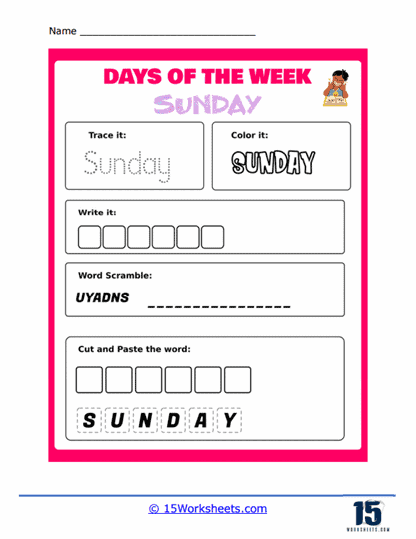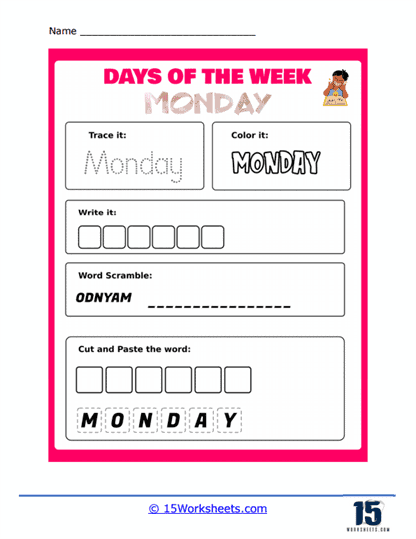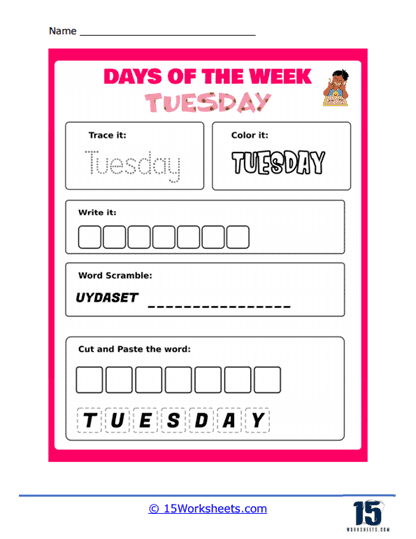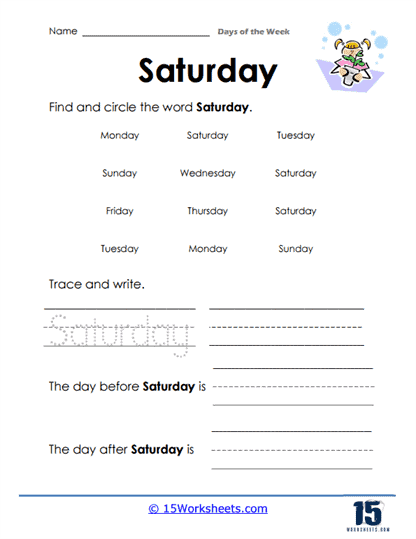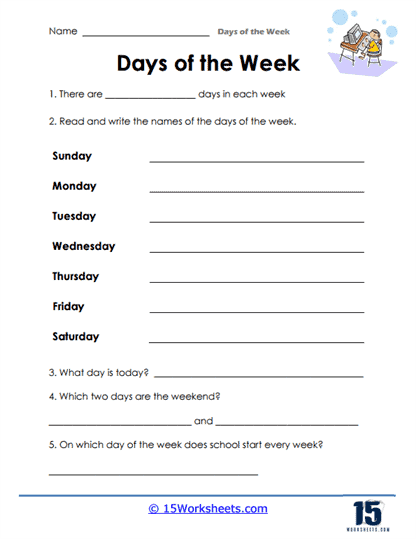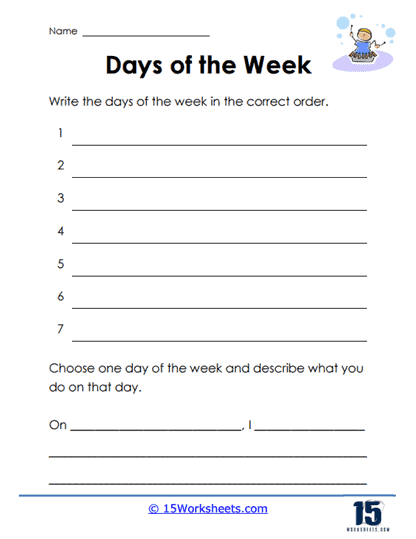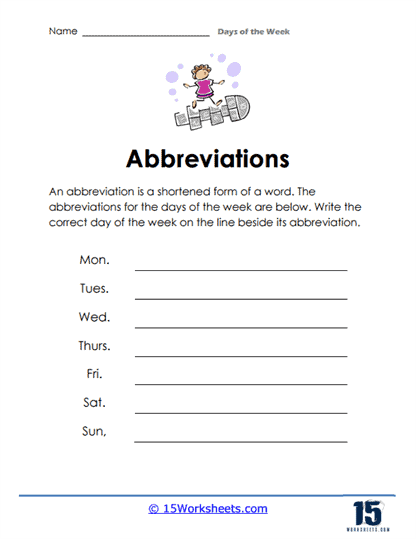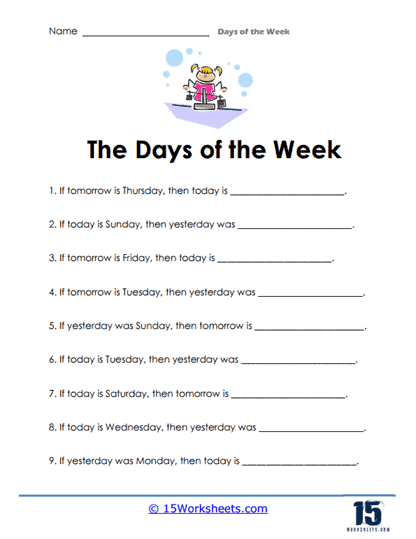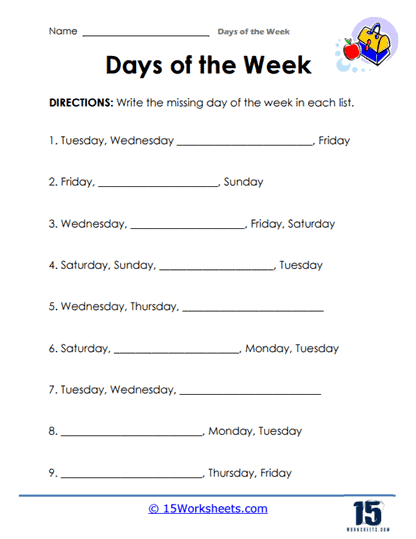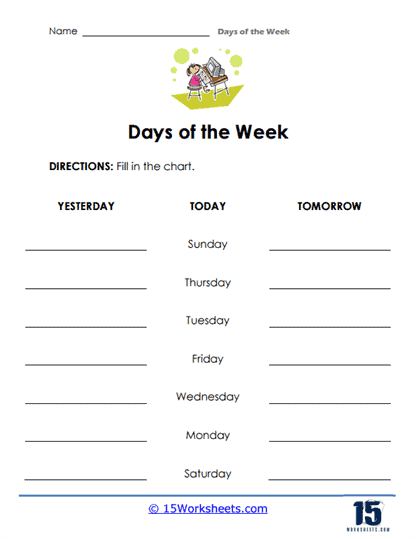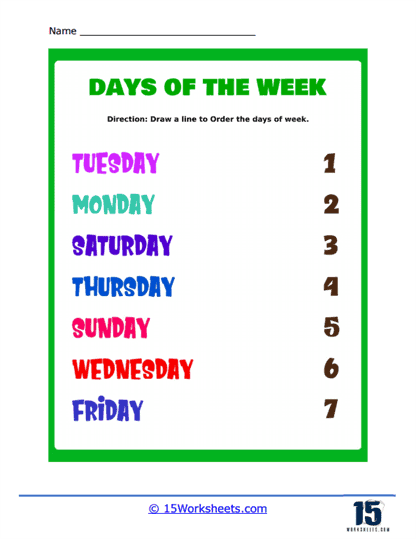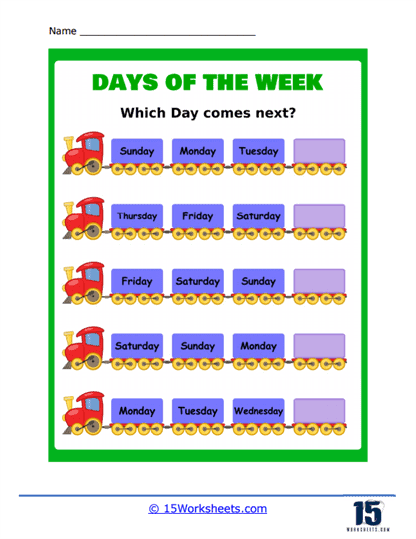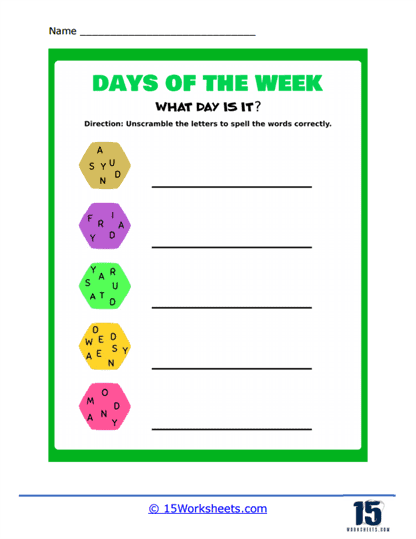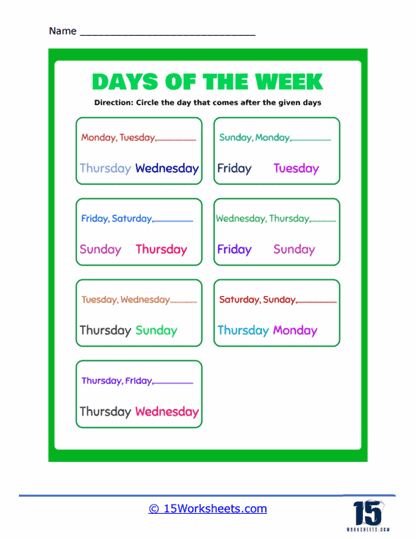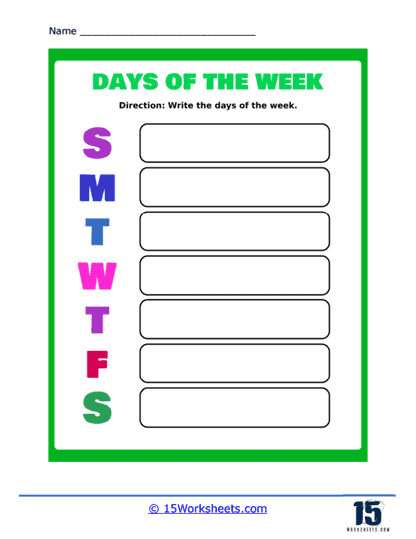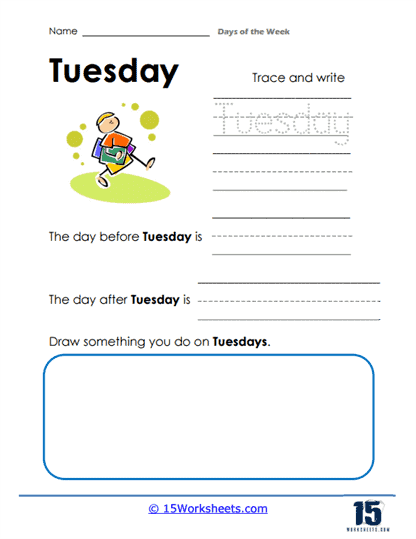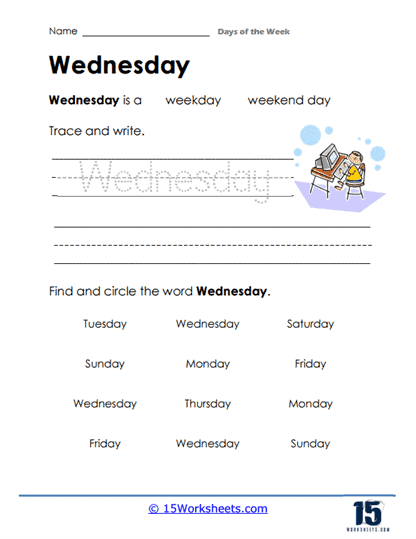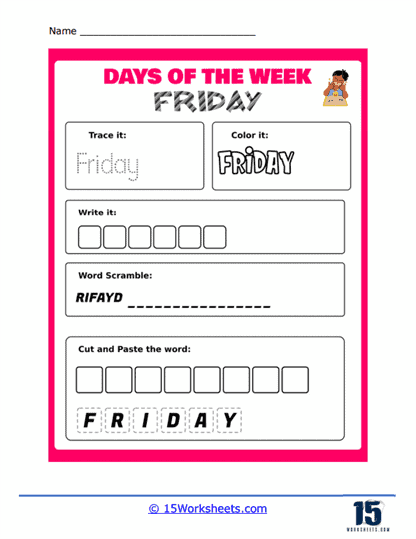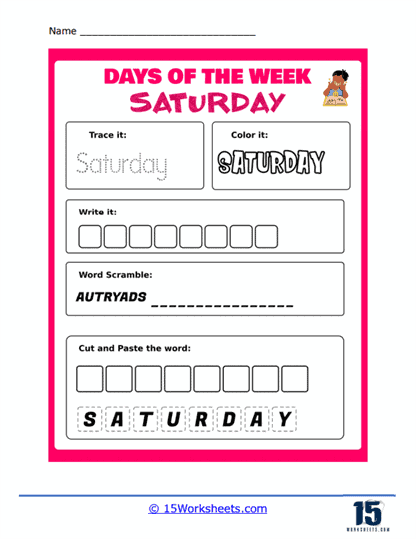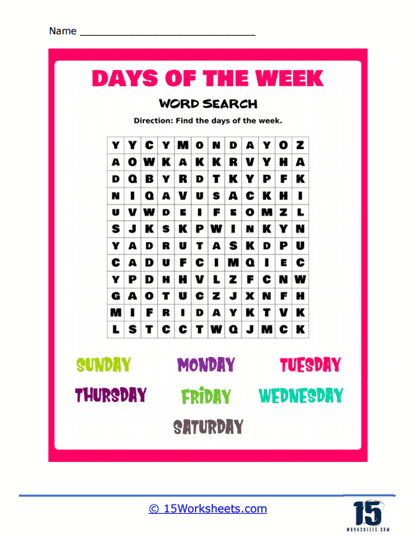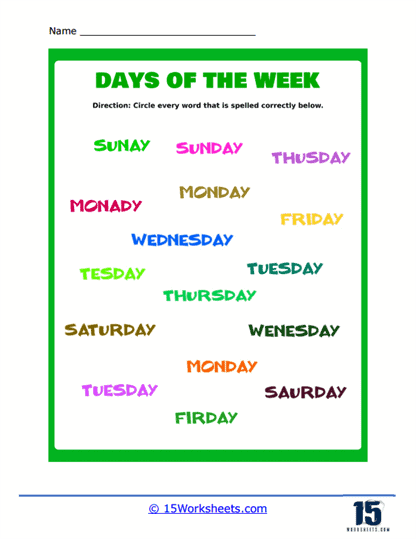Days of the Week Worksheets
All About These 15 Worksheets
Preschool is a pivotal time in a child’s life, marked by significant cognitive and social development. As young learners begin to grasp the concept of time and routines, understanding the days of the week becomes a crucial milestone. The collection of Days of the Week worksheets for preschool students provides a valuable resource for educators and parents to introduce this fundamental concept. These worksheets not only aid in teaching the days of the week but also offer a range of benefits that support early learning and routine building.
Our Days of the Week worksheets were designed to help children learn and practice the sequence and names of the seven days of the week. These worksheets typically include a variety of activities aimed at teaching children to recognize, spell, and understand the concept of days in a week. Some common elements of Days of the Week worksheets may include:
Tracing – Children can trace the names of the days of the week to become familiar with their spelling and improve their handwriting skills.
Sequencing – Worksheets may require children to arrange the days of the week in the correct order, helping them understand the weekly cycle.
Matching Activities – Children may be asked to match the days of the week with their corresponding abbreviations or with activities/events typically associated with each day.
Word Searches or Crossword Puzzles – These activities can help reinforce the spelling and recognition of the days of the week.
Reading and Writing Activities – Children may be given prompts to write about or discuss their favorite day of the week or what they usually do on specific days.
Coloring Activities – Worksheets can include coloring pages that correspond to each day of the week or incorporate themes related to daily activities or routines.
Days of the Week Songs or Rhymes – Songs, chants, or rhymes can be used to teach the days of the week in a fun and engaging way.
Days of the Week worksheets can be used in various settings, such as classrooms, therapy sessions, or at home, and can be adapted to suit different age groups and developmental levels. These worksheets help children develop their memory, sequencing, and language skills, while also introducing them to the concept of time and daily routines.
A Deep Look At Individual Worksheets
For starters, the Sunday Puzzle, Monday Puzzle, Tuesday Puzzle, Wednesday Puzzle, and Friday Puzzle are like a quirky calendar gone rogue, helping students practice individual day recognition through thematic challenges. (It’s suspiciously like tricking kids into learning by pretending it’s a game-diabolical, really.) Add in Super Saturday and Studying Saturday, and the weekend gets some unexpected academic love too-because fun doesn’t take weekends off.
Next, there’s a group of worksheets that might as well be time-travel simulators for kids. Yesterday, Today, Tomorrow, What Comes Next, and Follow The Order test a child’s ability to put days in the correct sequence-which, when you’re six and time is an abstract soup, is basically rocket science. Weekly Sequence continues this mission with a firm belief that understanding the passage of time will help them eventually master the art of showing up for things. And Draw A Line-oh yes-because sometimes the only way to survive the existential burden of weekly order is to connect dots with a crayon and feel a fleeting sense of control.
Now let’s talk about language. The worksheets Unscramble The Words, Spelling Master, and Missing Letters would make a spelling bee contestant sweat. These worksheets sneakily train phonics and spelling by throwing the days into linguistic blender mode. Students must pull order from chaos-just like we all do on Monday mornings. Meanwhile, Circle It asks kids to find and circle the correct day, like it’s hiding from them in a crowd, which it probably is, because Thursday always looks suspicious. Learn The Abbreviations is perfect for when “Wed.” starts sounding like a strange medical condition and “Sat.” feels like unfinished business.
Then come the worksheets that challenge students to reflect deeply-perhaps too deeply-on their own routines and habits. The Best Day, Sundays, I Usually, On Mondays, and 3 Things Thursday push students into the realm of day-specific introspection. Why is Friday the best day? What dark truths hide behind a child’s admission that they “usually clean up Legos” on Sundays? Thinking Thursday is a philosophical wonderland where students might ponder not only the day, but the meaning of all days. This is where small minds become deep thinkers, possibly before snack time.
To cement this cosmic journey into the seven-day structure, the worksheets Writing Seven Days, Tracing Days, and Word Search Fun focus on repetition and recognition. Because before we can conquer time, we must first spell it correctly-over and over again. There’s something meditative about tracing “Wednesday” until it becomes muscle memory. These foundational sheets close the loop of learning: from messy puzzles to philosophical musings, the “Days of the Week” worksheets create a full, absurdly delightful curriculum where time itself bends, stretches, and-just maybe-starts to make sense.
Tips for Teaching Kids the Days of the Week
Teaching kids the days of the week can be fun and engaging. Here are some tips to make the learning process enjoyable and effective:
1. Start with the basics: Begin by introducing the names of the days one at a time. Start with Sunday, and then add the other days sequentially. This will help kids understand the order of the days and remember them more easily.
2. Use visuals: Create a visual aid with the days of the week, either on a whiteboard, poster, or chart. You can use different colors or pictures to make it more engaging. Encourage your child to interact with the visual aid by pointing to the days or tracing the words.
3. Sing a song: Use a catchy tune to help children remember the days of the week. There are many songs available online, or you can create your own. Encourage your child to sing along and practice the song regularly.
4. Daily routine: Incorporate the days of the week into your child’s daily routine. For example, ask them what day it is today, what day was yesterday, or what day will tomorrow be. This will reinforce the concept and help them become more familiar with the days.
5. Days of the week activities: Plan activities or tasks for each day of the week. This could include specific chores, outings, or special meals. This will help your child associate the days of the week with specific events.
6. Storytelling: Use stories to illustrate the concept of the days of the week. You can find children’s books on this topic or create your own stories featuring the days of the week.
7. Calendar: Introduce a calendar in your home and encourage your child to mark off the days as they pass. This will help them visualize the progression of the week.
8. Play games: Create games that involve the days of the week, such as matching, sorting, or memory games. This will make learning fun and engaging.
9. Teach in context: Help your child understand the concept of weekdays and weekends. Explain the difference between school days and non-school days, or workdays and non-workdays.
10. Be patient and consistent: Learning the days of the week might take some time. Be patient and keep reinforcing the concept through different activities and daily routines. With consistency, your child will eventually learn and remember the days of the week.
Remember that every child learns at their own pace, so don’t worry if it takes a little longer for your child to grasp the concept. The key is to keep it fun and engaging, so your child stays interested and motivated to learn.
Benefits Of These Worksheets
The early years of a child’s education are a critical time for developing foundational skills that will support future learning and personal growth. One effective way to foster these early skills is through the use of Days of the Week worksheets. These seemingly simple resources offer a wealth of educational advantages, helping children grasp important concepts that go far beyond just learning the names of the days. By engaging with these worksheets, preschool students gain more than just knowledge-they build routines, strengthen language and math skills, and grow emotionally and socially in ways that will benefit them for years to come.
Building Foundational Knowledge
At its core, the study of the days of the week introduces children to the basic structure of time. While this might seem elementary, it lays the groundwork for much more advanced learning later on. Understanding how the days fit together sequentially helps students begin to conceptualize time as a continuous and organized system. This understanding is crucial for later lessons in history, science, and even literature, where timelines and sequences play a major role. This collection serve as the first step in this journey, providing children with a fun, interactive way to engage with the concept of time while establishing a solid foundation for future academic success.
Routine and Organization
One of the most important benefits of teaching preschool students the days of the week is how it fosters a sense of routine and organization. These are vital life skills that children will rely on throughout their lives. As students become familiar with the structure of the week, they begin to understand how time is divided and how certain activities are tied to specific days. This knowledge helps them start to anticipate what comes next, whether it’s school, playtime, or family events. By practicing this concept in a structured way through worksheets, children not only learn to manage their time but also develop an early understanding of planning and scheduling, which are key components of effective time management and productivity.
Language Development
Engaging with Days of the Week worksheets also plays a critical role in language development. As students learn to say, read, and eventually write the names of the days, they expand their vocabulary and improve their ability to express themselves. Discussing the days of the week in context, such as talking about activities they do on certain days, encourages children to form complete sentences and develop better communication skills. This practice is especially important during the preschool years when children are rapidly acquiring new language abilities. By reinforcing their understanding of these words through worksheets, students enhance their verbal skills, which will aid them in both academic and social settings.
Laying the Groundwork for Future Learning
The act of sequencing and ordering the days of the week might seem like a simple task, but it introduces children to fundamental mathematical concepts such as patterns, order, and time intervals. As they learn to place the days in the correct order, students begin to grasp the idea of sequencing, which is a key skill in both math and problem-solving. These early experiences with patterns and logical thinking prepare students for more complex mathematical learning in the future, such as understanding numbers, operations, and even geometry. By incorporating Days of the Week worksheets into the curriculum, educators give students an early start on building the skills they will need for success in math-related subjects.
A Step Toward Responsibility
As students become more comfortable with the days of the week, they begin to participate more actively in daily routines, both at home and in school. Knowing what day it is allows them to prepare for upcoming events, whether that means getting ready for a field trip or knowing it’s time for a special activity like “Friday Show and Tell.” This growing sense of independence is empowering for young learners. It encourages them to take ownership of their schedule and responsibilities, fostering a sense of accountability that will serve them well as they move through school and into adulthood. Days of the Week worksheets help nurture this independence by giving children the tools they need to manage their own routines with confidence.
Social and Emotional Growth
Understanding the structure of the week doesn’t just help with practical tasks-it also contributes significantly to a child’s emotional well-being. Routines provide a sense of predictability and stability, which is especially important for young children who are still learning to navigate the world around them. Knowing that certain events happen on specific days can reduce anxiety and help children feel more in control of their environment. For example, if a child knows that every Saturday is a family day, they can look forward to that time with anticipation rather than uncertainty. Days of the Week worksheets reinforce this sense of structure, helping children feel secure and supported as they develop both socially and emotionally.
Engagement and Fun
While the educational benefits of these worksheets are clear, one of their greatest strengths is that they make learning fun. These worksheets are often designed with bright colors, engaging activities, and interactive elements that capture the attention of young learners. By turning the study of time into a game or a creative task, educators can motivate students to engage with the material more fully. This sense of enjoyment is critical in early education, where cultivating a love of learning can set the stage for long-term academic success. When children are excited about what they’re learning, they are more likely to retain information and apply it in meaningful ways.
A Foundation for Lifelong Learning
Incorporating these worksheets into early childhood education is more than just a way to teach time-related vocabulary; it’s a comprehensive tool that supports a child’s cognitive, social, and emotional development. Through these worksheets, students not only learn about the days of the week, but they also acquire essential skills such as time management, routine-building, language development, and math readiness. They begin to gain independence, reducing anxiety by understanding predictable routines, and setting the stage for future academic and personal success.

